Moderna Shares Plunge as Company Cuts R&D Spending and Delays Break-Even
Moderna's stock tumbles as it announces R&D cuts and pushes break-even to 2028. The biotech firm's 2025 revenue forecast falls short of Wall Street expectations, causing investor concern.

Moderna Inc., a prominent biotech company, experienced a significant drop in its stock value on September 12, 2024, following announcements of research and development (R&D) spending cuts and a delayed break-even point. The Cambridge, Massachusetts-based firm, known for its innovative mRNA technology, has faced challenges in maintaining investor confidence amid changing market dynamics.
The company revealed plans to reduce its expected R&D expenses by approximately 20% for the period 2025-2028, lowering the budget from $20 billion to $16 billion. This decision aims to optimize resource allocation and streamline operations. Moderna also anticipates an annual spending reduction of about $1.1 billion starting in 2027 through cost-cutting measures and portfolio prioritization.

Moderna's financial outlook has raised concerns among investors. The company now projects its break-even point in 2028, a significant delay from the previously announced target of 2026. Additionally, Moderna's revenue forecast for 2025 ranges from $2.5 billion to $3.5 billion, falling short of the $3.87 billion anticipated by Wall Street analysts.
These developments have led to a sharp decline in Moderna's stock price. Before market opening on the announcement day, shares were down 12% to $69.61. This continues a downward trend that has seen the stock lose 20% of its value since the beginning of 2024, when it was trading around $100.
Despite these challenges, Moderna maintains a strong product pipeline. The company's portfolio includes the Spikevax COVID-19 vaccine, which received regulatory approval in 2020, and a recently approved vaccine for respiratory syncytial virus (RSV). Moderna is also developing a combination flu/COVID vaccine and an RSV vaccine for high-risk younger adults, both of which are expected to be submitted for regulatory review in 2024.
"While we face short-term challenges, our innovative pipeline and strategic cost management will position us for long-term success in the evolving healthcare landscape."
It's worth noting that Moderna's journey has been remarkable since its founding in 2010. The company, which had no marketed products before the COVID-19 pandemic, saw its market capitalization soar to over $100 billion at its peak. Moderna's mRNA technology platform, developed years before the pandemic, proved crucial in rapidly producing one of the first authorized COVID-19 vaccines.
As Moderna navigates these financial adjustments, it continues to work on vaccines for various diseases, including cancer and rare genetic disorders. The company's partnerships with governments and organizations worldwide, along with its inclusion in the NASDAQ-100 index, underscore its significant role in the biotechnology sector.
The coming years will be critical for Moderna as it strives to balance cost-cutting measures with maintaining its innovative edge in the competitive pharmaceutical landscape.


































